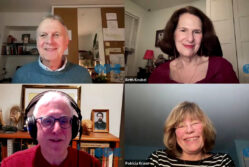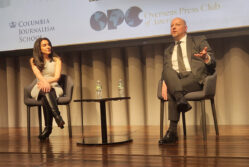
Buzzfeed, Mashable and VICE Ramp Up Global News
As newspapers and traditional media shrink overseas bureaus, three digital media powerhouses are ramping up their international coverage. Editors from Buzzfeed, Mashable and VICE shed light on their strategies for a capacity crowd during a panel at the NYU Arthur L. Carter Journalism Institute on Thursday night co-sponsored by the OPC.
Amy O’Leary of The New York Times innovation team facilitated the discussion.
The editors described a shoestring approach to international coverage that included low overhead and use of social media to reveal conditions and sentiment on the ground.
“We don’t stay at the Ritz,” said Miriam Elder, foreign editor for Buzzfeed. The outlet does not pay for permanent offices abroad and hires reporters who speak the local language to cut down on translation costs, which leaves more money for top priorities like travel and security.
Louise Roug, global news editor of Mashable, said since her publication doesn’t compete directly with traditional media, editors have more freedom to decide how much attention to give individual stories.
“We have that luxury, in maybe a way The New York Times doesn’t. I don’t have to be the paper of record, so I don’t have to write 800 words,” on a story that doesn’t warrant it, she said. Working in a smaller organization also means more nimble decision making, and encourages staff to take greater creative risks with coverage, Roug said.
O’Leary asked the panelists to address whether they struggle with credibility, given reliance on social media posts, or Buzzfeed’s mix of entertainment content and deep reporting.
“To me it’s more like a TV station. One day at 8:00 they’ll have The Simpsons, and then at 10:00 they’ll have the nightly news. Does the fact that there’s The Simpsons affect how you think about the nightly news?” Elder said.
“We’re super transparent with our methodology,” Roug said. “We very much try to do that. This is what we know, this is how we got it, these are our sources.”
“We don’t have a 100-year history to impress everyone,” said Jason Mojica, the Editor-in-Chief of VICE News. “It really comes down to: is the work really good and is it true, and does it hold up to scrutiny? It’s kind of pure in that way.”
In August, VICE News released a five-part series on the Islamic State, in which reporters were given unprecedented access to the violent militant organization. Mojica said their access came with “conditions” that enabled them to get in and out without harm, though he declined to elaborate on details. “You understand you’re operating under a peculiar set of rules,” he said.
During a Q&A session, an audience member asked if those conditions amounted to collusion.
“Every interaction between a journalist and subject is basically an act of combat, in which two parties are both trying to get very different things out of a shared experience,” Mojica answered.
“And I think the folks in the Islamic State are not dumb, so I have to assume that they have their reasons for giving us the access that they did, and they had hopes and beliefs.”
For NYU journalism students in the crowd, Thursday’s panel brought some hopeful news. Elder is doubling her foreign desk staff at Buzzfeed, and asked attendees to pass resumes her way.



